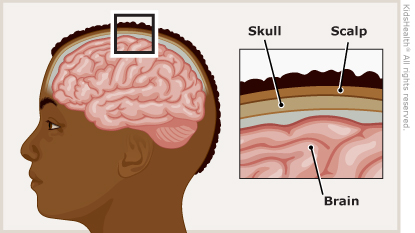While your child was in the hospital, the health care team may have given intravenous (IV) fluids and pain medicines. After a head injury, kids and teens can vomit, feel sick to the stomach, or have dizziness. This usually lasts a short time and kids feel better quickly. Your child may have swelling around the injured area because of some bleeding under the skin. At home, continue to check your child for any new symptoms.



Your child:

Your child:
If your child is hard to wake up, passes out, or has a seizure, call 911.

How can we help protect our child from head injuries? One of the most important ways you can help prevent your child from getting a head injury is by reinforcing the use of helmets at all times. This includes when your child plays sports, rides a bike, or is roller skating, skateboarding, or skiing.
Only buy helmets that meet U.S. Consumer Product Safety Commission (CPSC) standards. As your child grows, make sure to check the fit of the helmet.
What can we do for our child at home? At home, make sure your child takes it easy and rests when needed. Offer plenty of fluids to avoid dehydration. Wait until the health care provider says it's OK before your child returns to rough play or sports.